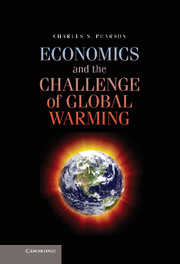Book contents
- Frontmatter
- Contents
- Acknowledgments
- Introduction and a Road Map
- 1 Climate Change
- 2 The Role of Benefit Cost in Climate Policy
- 3 Discounting and Social Weighting (Aggregating over Time and Space)
- 4 Empirical Estimates
- 5 Strategic Responses
- 6 Targets and Tools
- 7 Trade and Global Warming
- 8 The Challenge of International Cooperation
- 9 Beyond Kyoto
- 10 A Summing-Up
- Index
- References
3 - Discounting and Social Weighting (Aggregating over Time and Space)
Published online by Cambridge University Press: 05 June 2012
- Frontmatter
- Contents
- Acknowledgments
- Introduction and a Road Map
- 1 Climate Change
- 2 The Role of Benefit Cost in Climate Policy
- 3 Discounting and Social Weighting (Aggregating over Time and Space)
- 4 Empirical Estimates
- 5 Strategic Responses
- 6 Targets and Tools
- 7 Trade and Global Warming
- 8 The Challenge of International Cooperation
- 9 Beyond Kyoto
- 10 A Summing-Up
- Index
- References
Summary
Introduction
This chapter continues our inquiry into whether benefit cost (BC) is an appropriate tool for setting global-warming policy. It considers the controversial and related issues of discounting and social weighting. Underlying the discounting debate is a central question: Given that damages will extend over centuries, does the very process of discounting inevitably rule out strong action today to limit global warming? Underlying the social weighting debate is another central question: If we discount the consumption of future generations because they may be richer than us, should we not also weight the losses to the poor more heavily than losses to the rich?
The structure of the chapter is as follows. After some preliminaries, we review the descriptive and prescriptive approaches to the discount rate. Next we examine the so-called Ramsey equation, which underpins most of the global-warming discount literature. The final section considers “social” or “equity” weighting of costs and benefits.
- Type
- Chapter
- Information
- Economics and the Challenge of Global Warming , pp. 43 - 72Publisher: Cambridge University PressPrint publication year: 2011



